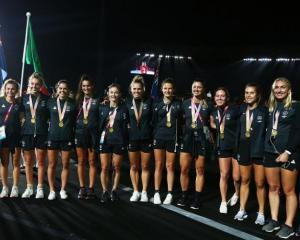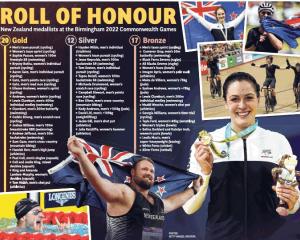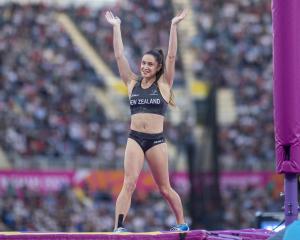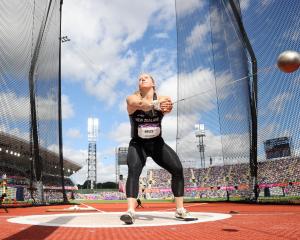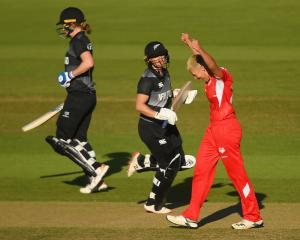The quadrennial celebration of sport that is the Commonwealth Games begins in Glasgow on Thursday. Sports editor Hayden Meikle digs into the personalities and the memorable moments for this A to Z.
A is for Alexis Pritchard. She fought at the London Olympics, finishing fifth in the 60kg class, and goes to Glasgow as women's boxing appears at the Commonwealth Games for the first time.
B is for Big Tom Walsh. The Timaru builder is a throwback in the best possible way. Finished in the top 10 at the world indoor shot put championships, and his battle with New Zealand team-mate Jacko Gill will be a highlight.
C is for Cash. The first Games, in Hamilton (Canada, not New Zealand) in 1930, cost about 50,000 to host. They say Glasgow has spent 563 million.
D is for Dick Tayler. Probably No1 on the list of most memorable New Zealand Commonwealth Games moments. Tayler's 10,000m victory in 1974 was a classic.
E is for Exhaustion. Few can forget the shocking sight of New Zealand walker Craig Barrett collapsing in the Kuala Lumpur heat in 1998. Barrett won silver in Manchester four years later.
F is for Fivepeat. The New Zealand sevens team chases a fifth consecutive gold medal in Glasgow. The first team to win gold, if you're interested, was Christian Cullen, Rico Gear, Jonah Lomu, Caleb Ralph, Roger Randle, Amasio Valence, Bruce Reihana, Eric Rush, Dallas Seymour and Joeli Vidiri. Wow.
G is for the Gold Coast, which hosts the Commonwealth Games in 2018. New Zealand has not been host since 1990.
H is for History. Like so many great sporting events, the Commonwealth Games started thanks to a journalist. Canadian reporter Melville Marks ''Bobby'' Robinson, inspired by the Amsterdam Olympics in 1928, lobbied for the ''Empire Games'' and the first event was held in his home town. It featured just 11 teams and 400 competitors - Glasgow will have 6500 athletes from 71 nations.
I is for Ian Thorpe. Now out and proud, the champion Australian swimmer was just 15 when he won four gold medals in Kuala Lumpur in 1998, prompting veteran Australian coach Don Talbot to say: ''You can't believe he's 15. It's genetics gone bloody crazy!''J is for John Walker and Filbert Bayi. The New Zealander and the Tanzanian provided another immortal Games memory in 1974 when they took part in an epic 1500m final. Bayi won, but both men broke the world record.
K is for Kylie Minogue. The Australian singer is rumoured to be performing at the closing ceremony in Glasgow. We should be so lucky.
L is for Lauren Boyle. New Zealand's queen of the pool will be desperate to win multiple medals in Glasgow.
M is for Miracle Mile. The mile race in Vancouver in 1954 is considered by many to be the definitive moment of the Commonwealth Games. Englishman Roger Bannister and Australian John Landy were in peak form and both went under four minutes.
N is for Nikki Jenkins. The face of the 1990 Games in Auckland. Won gold in the women's vault at the tender age of 14.
O is for OMG. That was the reaction of the younger folks when the Silver Ferns won an extraordinary gold medal at the Delhi Games in 2010. The game against Australia went into double overtime, an incredibly rare occurrence in netball. Maria Tutaia led the New Zealanders to a 66-64 win.
P is for Precious McKenzie. The South African-born weightlifter with the magnificent name won three gold medals for England and one for New Zealand. All while being, er, vertically challenged.
Q is for Queen. She will be at the opening ceremony at Celtic Park to read the message from ''her'' baton that will have travelled 190,000km to get to Glasgow.
R is for Rushlee (Buchanan, cycling), Reta (Trotman, cycling) and Rhiannon (Dennison, hockey). There are some interesting names in the New Zealand team. But Portia Bing (athletics) has the best.
S is for Success. New Zealand has won 130 gold medals, 189 silver medals and 245 bronze medals at the Commonwealth Games. In the all-time medal tally, New Zealand is ranked fifth behind Australia, England, Canada and India.
T is for Timberrrrr. That was what they were thinking when New Zealand weightlifter Graham May fell on his face with the small matter of 187.5kg above his head. You must have seen the clip by now - it screens about 50 times a year. The incident was yet another moment from the 1974 Commonwealth Games.
U is for Usain Bolt. Bah. The great Jamaican sprinter will not, sadly, run the 100m in Glasgow. But he is in the Jamaican relay team. And an ''interactive race track'' will allow fans to test their speed against a virtual Bolt.
V is for Valerie. No, not that one, though she is incredible. The first great Valerie in New Zealand sport was Val Young (nee Sloper), who won seven Commonwealth Games medals, including gold in the shot put (three times) and discus (twice).
W is for Willis, Saint Nicholas. He thrilled us all with his 1500m gold in Melbourne in 2006. In Glasgow, he will also run the 5000m, and he has been in good form.
X is (sort of) for X-cruciating. That sums up the pain inflicted on your eyes by the ghastly Scottish and Australian uniforms.
Y is for Yelavich, Greg. New Zealand's great shooter has won more medals (12) than any other Kiwi at the Games. His name is missing from the squad list for the first time since 1982.
Z is for Zilch, and also Zero. That is how much sleep you will get if you try to catch all the action on Sky Television's SIX Commonwealth Games channels.




